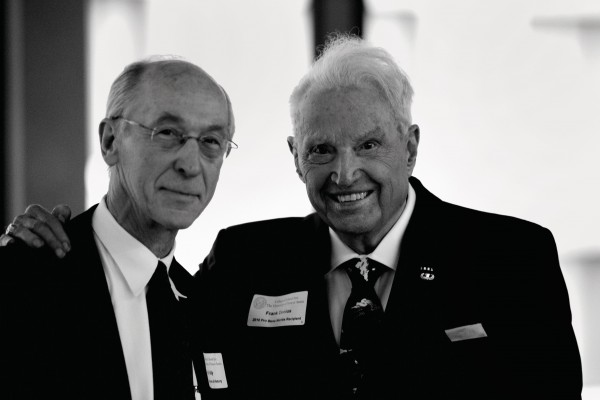Frank Denius’ commitment helps students understand World War II
Each spring, Frank Denius meets with a group of about 20 University of Texas at Austin students who are about to leave for Europe as part of the Normandy Scholar Program.
And each fall, Denius — the noted philanthropist, businessman and decorated World War II veteran — meets with some of those students after they’ve returned. They give him scrapbooks and photos of their studies abroad. And he sees just how powerful it is to learn about World War II on the battlefields of Europe.
“They speak with a voice and look with an eye that shows they’re in awe. It was just an awesome experience for them,” Denius says. “Several over the years have said ‘seeing that and participating in this program has changed my life and my thinking about the defense of freedom.’”
That’s what Denius had in mind in 1990 when he worked with then-university President William Cunningham and Texas Gov. Bill Clements to help establish and fund the History Department’s Normandy Scholar Program. Since then, nearly 400 students have studied the causes, history and consequences of World War II in the classroom, on the beaches of Normandy and at other sites in Europe.
Denius’ support for the Normandy Scholars was only natural given his personal history. The Athens, Texas native was part of the American invasion of Normandy, France in June 1944 and earned four Silver Stars during World War II.
“He is often described as one of the most decorated soldiers of the Second World War,” Thomas Hatfield, director of the Institute for Studies in American Military History at the university’s Dolph Briscoe Center for American History, said at the Pro Bene Meritis Awards banquet in April.
“I know something about that war and I can say that his four Silver Stars puts him in elite company because Silver Stars are not awarded for meritorious service in a safe place, but for valor in the face of the enemy.”
Denius is proud the program is run by some of the most respected professors on campus, and that its curriculum helps students grasp the larger lessons of World War II and understand the United States’ military and diplomatic involvement and its role in fostering democracy during and after the war.
“It’s extremely important that all American history be learned and understood by students both for their present education and their future,” he says.
After returning home from the war, Denius enrolled at The University of Texas at Austin and earned degrees from both the business and law schools in 1949. Since then, his name has been synonymous with the university.
The Longhorn football practice fields, the plaza outside the northwest corner of the stadium and the concourse in the alumni center all bear his name. He has served on the Commission of 125, the Board of Directors for the University of Texas Foundation and the University of Texas Development Board, among other committees.
Outside the Forty Acres, he has had a long career in the energy industry, including as chairman and now chairman emeritus of the Southern Union Company. He’s won acclaim for his far-reaching philanthropy work, much of it done through the Cain Foundation that he and his family oversees.
His wife, Charmaine Hooper Denius, is a past member of the university’s Fine Arts Advisory Council. Their children, F. Wofford Denius and Charmaine Denius McGill, serve as vice presidents and directors of the Cain Foundation and are both University of Texas graduates.
Recently, the foundation contributed money for the Normandy Scholars Program to have its own space in the new Liberal Arts building that will be constructed on the East Mall beginning next year.
That, in turn, will help future generations of students benefit from the program that Denius helped establish, nurture and sustain.
“The Normandy Scholar Program was by far my most rewarding academic experience at UT,” says Angela Daniel, a 2010 scholar. “To get to study such an important part of history with some of the best professors and brightest students, and then go to Europe to essentially live the history, was a once-in-a-lifetime experience.”
